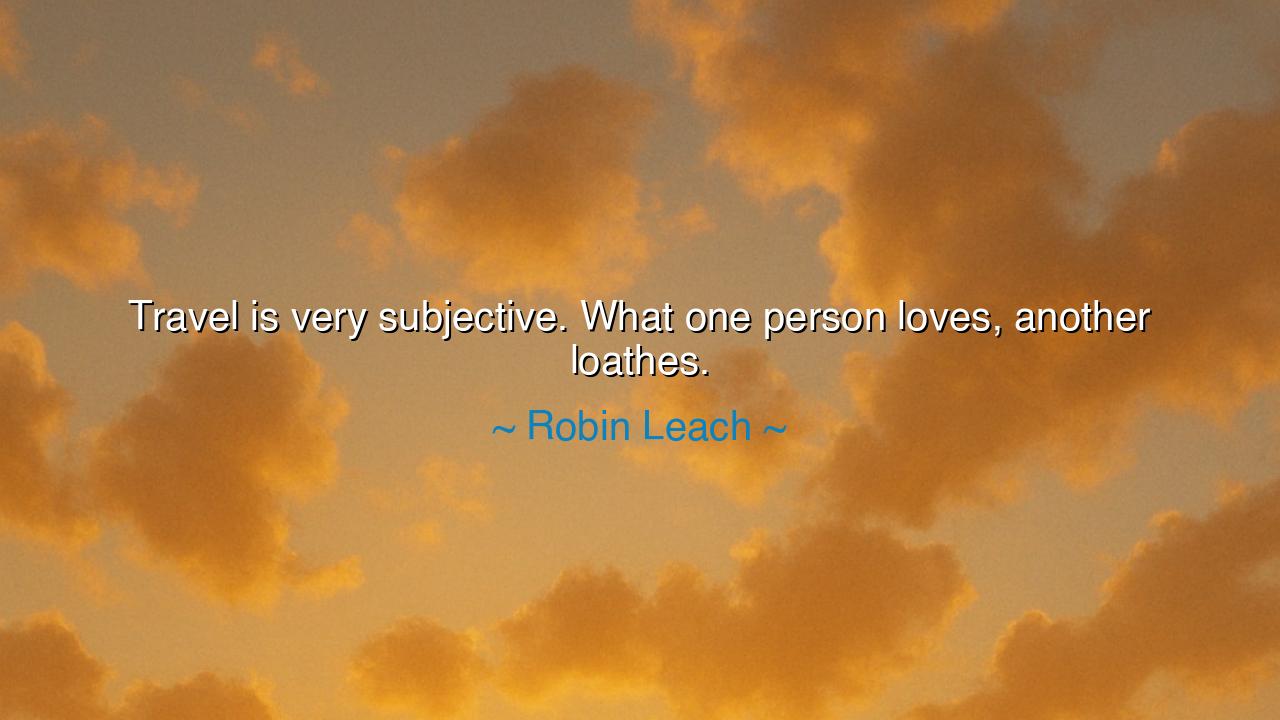
Travel is very subjective. What one person loves, another






Hearken, O traveler of the ages, to the words of Robin Leach: “Travel is very subjective. What one person loves, another loathes.” Though spoken in simple form, these words echo the eternal song of human difference, the truth that beauty and meaning are not bound in stone, but in the eye and heart of the beholder. What is paradise to one soul may be burden to another; what inspires awe in one may stir indifference in another. Thus, the road teaches us humility, for it reminds us that the world is vast not only in its landscapes but in the ways it is received by men.
The ancients knew this well. To the Greek philosopher Heraclitus, all was flux; no man stepped into the same river twice. So too is travel ever-changing, not only because the rivers shift, but because the soul of the traveler shifts. One man beholds the desert and sees only emptiness, while another sees the blazing majesty of the eternal sun. One woman may stand upon a mountain peak and feel her spirit lifted into the heavens, while another feels only the weight of cold and weariness. Thus, the journey is never the same twice, for it is measured not by the miles of the road but by the eyes of the one who walks it.
Consider the tale of Marco Polo, who journeyed from Venice to the court of Kublai Khan. To him, the lands of the East were filled with marvels beyond imagining—palaces of gold, spices that set the tongue aflame, and creatures unknown to the West. Yet when he returned and told his tales, many scoffed, saying he exaggerated, that such wonders could not exist. To Polo, the lands were glorious; to others, they were mere fables. This is the essence of Robin Leach’s words: what one loves, another dismisses or even loathes. The truth of travel is as much within the heart as upon the earth.
And yet, in this subjectivity lies a powerful teaching. If we recognize that not all will share our wonder, we learn to let go of judgment. We cease to measure the worth of a place by another’s reaction, and instead we learn to walk our own path. For the joy of travel is not in proving that one place is better than another, but in discovering where one’s own soul feels most alive. To love a place deeply, even if others do not, is to honor the uniqueness of your own spirit.
Moreover, let us not forget the bonds of empathy. For though you may loathe the crowded market, your companion may delight in its chaos. Though you may shrink from the storm, another may rejoice in its wildness. By seeing through their eyes, you expand your own horizon. Thus, subjectivity need not divide, but can become the very thread that weaves travelers together. To share differing joys is to learn the vastness of the human heart.
Therefore, O listener, learn this lesson: do not mock what another adores, nor despise what they disdain. Walk your road with openness, and grant to others the freedom of their own path. In doing so, you will not only travel the world, but also travel the souls of mankind, discovering that diversity of love and loathing is itself the great beauty of existence.
Practical action lies before you: when you journey, pause not only to see but to reflect. Ask yourself why your heart soars in one place and falters in another. Listen to your companions’ joys and sorrows without scorn, and let each difference be a teacher. Thus, your travels will not only stretch across the earth but deepen into wisdom.
So I proclaim: Robin Leach’s words are not mere observation but eternal truth. Travel is indeed subjective; what one loves, another may loathe. Yet therein lies the miracle—that no land, no sea, no mountain, no city is ever wasted, for each finds its lover somewhere, sometime. And the world, in its infinite variety, becomes a tapestry where every soul may find a home.






AAdministratorAdministrator
Welcome, honored guests. Please leave a comment, we will respond soon